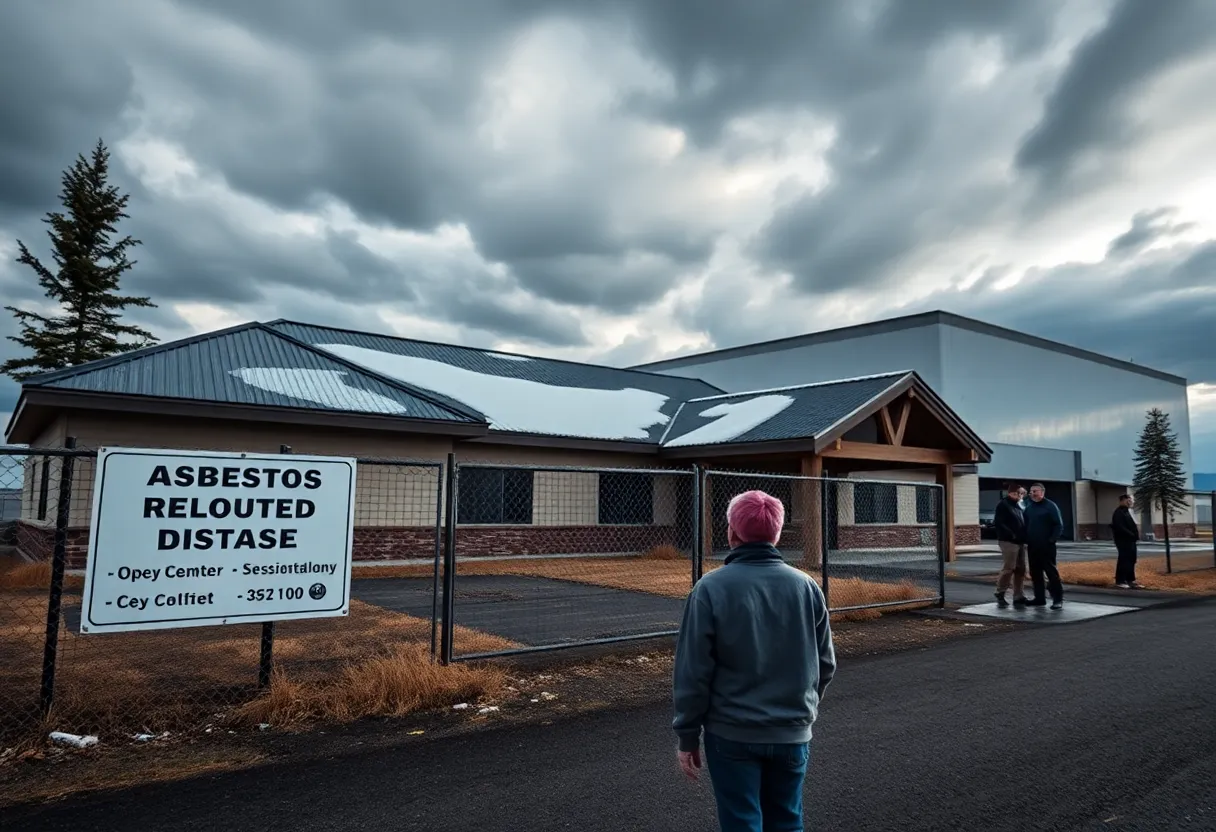News Summary
The closure of the CARD clinic in Libby, Montana, raises serious public health concerns for residents affected by asbestos exposure.
Asbestos Screening Clinic Shuttered by Court Order, Leaving Libby Residents in Limbo
In a shocking turn of events, the Center for Asbestos Related Disease (CARD), an essential asbestos screening clinic in Libby, Montana, has been shut down following a court order. This closure was executed by the Lincoln County Sheriff’s Office under a Writ of Execution to seize the clinic’s assets, triggering widespread concern among local residents who are grappling with the devastating impacts of asbestos-related diseases.
Consequences of the Shutdown
Libby, a small town with a population of approximately 3,000, has long faced the repercussions of asbestos exposure due to a nearby mine that was operational for several decades. This mine produced asbestos dust that contaminated the area, leading to a surge in health issues among its residents. The closure of CARD is an alarming development as the clinic has provided critical health screenings, monitoring, and treatment for over 20 years, aimed at combating the region’s dire health crisis.
The court’s decision followed a lawsuit by BNSF Railway Company, alleging that CARD fraudulently facilitated government benefits for patients, specifically asserting that more than 2,000 diagnoses made by the clinic, including 337 that were found to be false, were improperly obtained. The judgment against CARD totaled a staggering $6 million, which has placed the clinic in a critical financial position leading to its bankruptcy declaration.
Long-standing History of Contamination
The implications of this closure extend beyond just clinic operations. Libby’s residents are now left with fewer resources available for early detection and treatment of asbestos-related issues. The asbestos mine linked to Libby’s health problems was in operation from the 1920s until 1990, and its remnants remain a lingering threat. The Environmental Protection Agency (EPA) recognized this grave situation, placing the site on the Superfund program’s National Priorities List in 2002, reflecting the severity of the contamination.
Legal Dispute Between CARD and BNSF
The legal battle surrounding the clinic includes accusations of medical malpractice as well. A lawsuit has been filed against CARD and its Executive Director for allegedly prescribing opioid painkillers based on misdiagnosed health issues stemming from the fraudulent diagnoses. This multifaceted legal struggle not only threatens the clinic’s future but also raises serious questions about patient care and the integrity of diagnoses provided to those reliant on the clinic’s services.
Moreover, the closure places significant pressure on local health services as CARD’s operational budget is heavily supported by a substantial grant from the Centers for Disease Control and Prevention (CDC), which accounts for 80% of its funding. This grant is currently under review, and concerns have been raised about its future under the Trump Administration’s scrutiny.
BNSF Railway’s Complicated Role
BNSF Railway, owned by billionaire Warren Buffett, is not only battling multiple lawsuits from asbestos victims in Libby and surrounding areas but also stands accused of contributing to the town’s contamination through its transportation of polluted materials. The implications of these lawsuits have cast a shadow over the company, intensifying the scrutiny and public sentiment surrounding its operations and corporate responsibility.
The chain of events leading to CARD’s closure has highlighted the ongoing struggle between corporate interests and public health in this small Montana community. As Libby’s residents confront the reality of reduced access to essential health services and screenings, a shadow looms over the future well-being of those afflicted by the long-term consequences of asbestos exposure.
Conclusion: A Community in Crisis
The abrupt closure of the CARD clinic signifies a critical blow to the health infrastructure in Libby, and community leaders are already expressing concerns over the worsening public health crisis. As the town rallies to navigate these uncharted waters, the need for continued advocacy, attention, and support remains paramount to address the long-standing ramifications of asbestos exposure. The plight of Libby’s residents stands as a stark reminder of the dangers posed by asbestos and the urgent need for ongoing health services.
Deeper Dive: News & Info About This Topic
HERE Resources
Odyssey of Bestwall LLC: The Clash of Asbestos Claims and Bankruptcy
Bestwall LLC’s Bankruptcy Appeal Sparks Controversy Over Asbestos Liabilities
Closure of Asbestos Screening Clinic in Libby, Montana
Health Risks From Urban Transformation in Kadikoy: A Communities’ Plea for Action
Closure of Libby’s Center for Asbestos Related Disease Clinic After Court Ruling
BREAKING NEWS: Asbestos Screening Clinic in Libby, Montana, Abruptly Shut Down
Bestwall’s Bankruptcy Battle: A Legal Tangle Over Asbestos Liability
Controversy Erupts as Asbestos Clinic in Libby, Montana, Faces Closure Amid Legal Battle
Closure of Asbestos Clinic Leaves Libby Residents in Health Limbo
The Closure of the CARD Clinic: A Blow to Libby’s Asbestos Victims
Additional Resources
- Associated Press: Asbestos Clinic Closure in Libby
- Wikipedia: Asbestos
- The Western News: Libby’s CARD Clinic Closed
- Google Search: Libby asbestos
- KPAX News: Libby Asbestos Clinic Shuttered
- Google Scholar: Asbestos Exposure in Libby
- Ottumwa Courier: Asbestos Clinic Forced to Close
- Encyclopedia Britannica: Asbestos Health Impacts



















